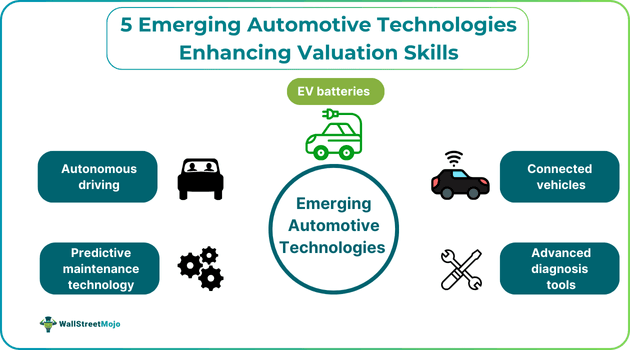5 Emerging Automotive Technologies Enhancing Valuation Skills
Table of Contents
Introduction
With the rapid advancements in the automotive sector, technological innovations have reshaped the way vehicles are made, designed, and serviced. In fact, everyone has been speculating over specific developments through the decades. Take electric vehicles or Tesla's Autopilot system, which allows driverless features without your intervention! Do these emerging automotive technologies impact the value of the vehicle? Well, let us delve deep into this blog to explore the top five trending automotive technologies and how they contribute to valuation skills.

5 Emerging Automotive Technologies
On account of different technological changes, manufacturers have had to adopt to significant alterations in vehicle designs and operations. However, you can expect the same hustle from vehicle appraisers operating in the industry as well. These technological advancements demand a new valuation approach, requiring valuers to be aware of the parts and services used in vehicles with the latest technologies.
Only if they are fully aware of the technological shift in the industry can they determine automotive valuation easily. Here are some of the emerging automotive technologies trending in the market.
#1 - Autonomous Driving Features
Well, switching to autopilot mode is what comfort feels to the drivers. You get to take a back seat and let the artificial intelligence or AI technology take over. The AI systems can navigate safely on roads by interpreting diverse data in real time. They use various sensors, like cameras, radars, and lidar and ensure 360-degree awareness, enabling vehicles to detect pedestrians, obstacles, or any other vehicle.
While these self-driving vehicles possess benefits, one can expect a certain level of challenges as well. With the driverless mode, safety concerns arise, and that also impacts the automotive valuation. Nevertheless, companies leveraging this emerging automotive technology will undoubtedly try to give utmost priority to safety, and the ability and willingness of customers to pay will also play a key role in determining the valuation of a vehicle.
#2 - Connected Vehicles
Big data and the Internet of Things, or IoT, are a massive help for car manufacturers and insurance companies. It helps them understand the vehicle’s performance better and generate a massive amount of data in return. Later, this data can be utilized to improve the safety and performance of the vehicle. For instance, many cars have a device connected to them that allows locking and unlocking features. Moreover, the data can further help in valuing the vehicle with accuracy. Additionally, many other providers deploy IoT tools to get better insights into the car's condition and alert the owner.
#3 - Advanced Diagnostic Tools
Predictive analytics are an important source of diagnostic tools for users. It uses the data collected from IoT and connected devices and forecasts the upcoming risks associated with the vehicle. For instance, if your car has some underlying issues (maybe malfunctioning or worn-out parts), it can warn you on a priority basis. In short, car owners can immediately learn about the vehicle's condition and determine whether to service or continue using it. A few of the car technology advancement tools include on-board diagnostics or OBD scanners, a multimeter, thermal imaging diagnosis tools, and tire pressure monitoring systems (TPMS).
The predictive analytics offered by these tools can significantly influence automotive valuation skills. Are you interested in developing a comprehensive understanding of how to use the tools to your advantage and determine a vehicle’s value accurately? In that case, opting for courses like the Automotive Service Technician program at STVT can prove beneficial. With the help of the training program, you can learn to diagnose and repair vehicle-related issues using the latest tools efficiently.
Also, one must note that predictive analytics can play a key role in predictive maintenance. In other words, the diagnostic tools can ensure proactive maintenance of the vehicle. This, in turn, can ensure that the car remains in optimal condition and also helps improve the vehicle’s lifespan.
#4 - EV Batteries
Alongside these emerging automotive technologies, electric vehicles have also gained the utmost popularity in the past few years. Without the need for fuel, these vehicles can cover significant distances by using batteries. Hence, when conducting the valuation of an EV, the type of battery is a crucial factor that appraisers must take into account. If an EV battery needs minimal charging and offers a suitable driving range, it indicates good performance. But, the opposite, i.e., a high charging duration and a low range, suggests poor performance. Eventually, the battery quality can degrade the performance of the vehicle and impact its value as well. Thus, analyzing key aspects of EV batteries is vital to determining a vehicle's accurate value.
#5 - Predictive Maintenance Technology
While predictive analytics are based on predicting and prevention, car manufacturers can deploy software to smoothen the process further. They can utilize the power of machine learning tools and sensors to analyze data previously collected from the car. It helps in determining faulty issues, anomaly detection, maintenance scheduling, and estimating the lifespan of the vehicle. So, if you assume the car needs no servicing, but the device alerts you, it is because it has detected an underlying problem in the vehicle.
However, this emerging automotive technology needs sufficient model training and monitoring for optimal performance. At times, faulty issues in a device can also occur. If that happens, the tool may fail to provide the data. On the other hand, when the tool performs effectively, you can expect it to collect data timely and transmit the same to automobile manufacturers. This data can further help in analyzing how this technology is beneficial in improving a vehicle's performance, safety, and overall operational efficiency.
Conclusion
Like many industries, even the automotive industry is also leading the forefront of innovation. The 5 emerging automotive industry trends have allowed exciting features like autonomous driving and OBD to exist, and understanding the importance of these features has enabled analysts to assess the risks and rewards associated with this industry.
In addition, utilizing advanced diagnosis and predictive maintenance tools has further helped in improving the efficiency and accuracy concerning automotive valuation. In the coming future, the development of this industry will continue and it will bring similar changes in vehicles that would, in turn, have a significant impact on valuation.

